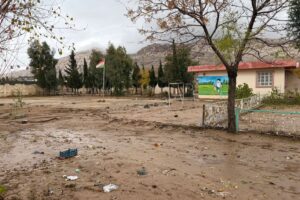
2025-07-31T19:35:42+00:00
font
Enable Reading Mode
A-
A
A+
Shafaq News
A violent standoff in southern Baghdad on Sunday has once
again laid bare the dangerous entrenchment of Iraq’s political patronage
system, where public office is often treated not as a vehicle for public
service but as a commodity to be possessed—sometimes by force.
The clash occurred at the Baghdad Agriculture Directorate
in the Dora district, where a newly appointed director attempted to assume
office. Rather than a routine administrative transition, the attempt led to a
deadly confrontation. The incumbent official refused to vacate his post,
reportedly prompting the new appointee to summon an armed group to enforce his
claim. The incident ended in bloodshed, but the shock it delivered extended far
beyond Dora: it offered a visceral illustration of a political culture in which
office-holding is both lucrative and fiercely defended.
From Public Service to Political Asset
This violent episode is not an isolated event, but a
symptom of a broader political and administrative pathology. As former Member
of Parliament Rahim al-Darraji told Shafaq News, Iraq’s current political
system has transformed public office into a personal investment. “These
positions are no longer about serving citizens,” he said. “They’re about
accessing state funds, securing contracts, and distributing benefits among the
officeholder’s family, party, and loyalists.”
The roots of this phenomenon lie in Iraq’s post-2003
political architecture, particularly the muhasasa system—a formulaic
distribution of power among ethno-sectarian and political blocs. While intended
to ensure inclusivity in the wake of Saddam Hussein’s fall, muhasasa has
instead hardened party control over state institutions.
Ministerial and bureaucratic posts are treated as political
spoils, allocated based on electoral muscle or factional bargaining rather than
competence or service delivery.
This practice has deeply eroded institutional
functionality. Officials are often selected not for their technical expertise,
but because they can be trusted to direct state resources back to the party
that appointed them. This turns bureaucratic appointments into zero-sum
contests where rotation of office is viewed as a loss of political
capital—leading to fiercely resisted removals and frequent power struggles
within ministries and local departments.
No One Resigns Voluntarily
The resulting climate of entitlement and impunity has made
the concept of resignation largely foreign to Iraq’s political culture. Former
MP Kazem al-Sayyadi was blunt, “No one gives up a position willingly—only if
forced by their party or to avoid a scandal.”
Political analyst Mohammed al-Rubaie drew a sobering
contrast between Iraq and functioning democracies. “In other countries,
officials resign if they underperform or fail the public. In Iraq, even when
disasters occur and lives are lost, no one steps down. There is no culture of
responsibility,” he told Shafaq News.
The real issue, al-Rubaie added, is the armor of political
protection. “When officials know their party will shield them, they act with
impunity. Accountability becomes meaningless.”
Indeed, the normalization of impunity has created a vicious
cycle: officials who perform poorly or engage in corruption are rarely
disciplined, especially if they belong to powerful blocs. This detachment from
accountability further incentivizes the commodification of office—and in cases
like the Dora confrontation, turns routine appointments into high-stakes turf
wars.
Weak Legal Instruments, Weaker
Enforcement
While Iraqi law does provide mechanisms for administrative
accountability, its application is inconsistent and often politicized. Legal
expert Mohammed Jumaa explained that while higher-ranking officials can
transfer or dismiss subordinates, the law does not obligate resignation even in
cases of proven misconduct. “The Discipline Law for state employees includes
sanctions for negligence, but enforcement is selective,” he noted.
This selectivity often stems from the very networks that
fuel Iraq’s patronage system. Superiors may hesitate to discipline
underperforming officials who belong to the same political faction. As a
result, laws intended to uphold administrative integrity are undermined from
within, rendering them largely symbolic in cases where political interests are
at stake.
The gap between legal authority and actual enforcement has
allowed a culture to flourish in which public positions are treated as
property, not responsibility. And when legal means of transition fail—as in
Dora—armed coercion becomes the fallback.
A Broader Pattern of Institutional
Decay
Though dramatic, the Dora incident is not exceptional.
Similar confrontations have been reported in provinces across Iraq,
particularly in departments where control over contracts, permits, or public
employment carries economic weight. Such offices are often operated as
extensions of party influence, rather than neutral service providers.
This pattern has had cumulative consequences. Citizens face
decaying services, widespread corruption, and rising public distrust, while
political actors use administrative positions as levers of power consolidation.
The result is a state structure hollowed out from within, where formal
institutions exist but are manipulated through informal networks and
personalistic politics.
Written and edited by Shafaq News staff.





